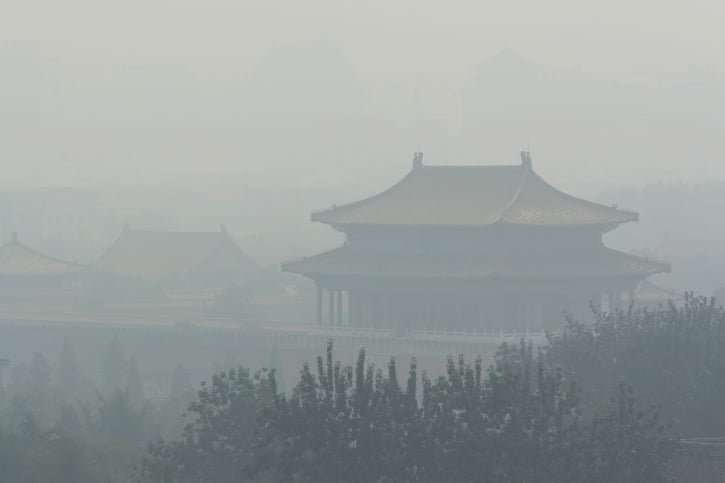
Source: Thinkstock
The film focuses on the problem of air pollution, which filmmaker Chai Jing attributes partly to the country’s massive steel- and coal-producing provinces, where environmental protections take a back seat to economic growth, and to the country’s oil industry, over which, Chai claims, the Ministry of Environmental Protection has little influence.
In a study completed in 2013 and published in the British medical journal Lancet, outdoor air pollution in China was found to have contributed to 1.2 million premature deaths in 2010, about 40% of the world’s total related to air pollution.
ALSO READ: The World’s Debt Is $199 Trillion and Growing
A 2007 report from the World Bank, “Cost of Pollution in China,” pointed out not only the cost of air pollution, but water pollution as well. The report noted that between the years 2001 and 2005 (the 10th Five-Year Plan), an average of 54% of the seven main rivers in China contained water deemed unsafe for human consumption. The same report suggested that premature deaths caused by air pollution cost the country about 3.8% of gross domestic product in 2003.
The filmmaker is an investigative reporter who worked for state-controlled China Central Television (CCTV), which was among the first to cover the SARS epidemic in 2003. She also has published two books of autobiography. She left CCTV after the birth of her daughter, who had been diagnosed with a benign tumor while still in the womb and required major surgery shortly after her birth in the United States. She is cited in The Guardian as saying that her concerns about the effect of the filthy air on her infant daughter’s health prompted her to produce the film.
In an article in Australia’s Business Spectator, Peter Cai writes:
The film reveals the power of the big three oil companies that threaten to shut down supplies if the central government agencies impinge on their turf. Even the most powerful National Development and Reform Commission, Beijing’s key economic planning agency and price regulator looks less omnipotent in front of the big oil bullies. … There are countless scenes of environmental officials who are unable to fine polluters or even stop offenders. One petrol station owner tells officials that they have the duty to collect samples from his shop – which is selling substandard diesel — but not the right. This anecdote alone nails the problem of environmental protection in China. The Ministry [of Environmental Protection] has the least power among big government agencies and state-owned enterprises.
ALSO READ: Half of Americans Fail to Save Money
This presents a huge problem for China’s leadership. As the World Bank study pointed out, “[P]eople in China value improvements in health beyond productivity gains.” And the concerns spread across economic status. The poor, as usual, are disproportionately harmed by air and water pollution. About 75% of low-income, rural households with children under five years of age have no access to piped water, about 50% higher than people in higher income areas.
China’s pollution problem provided the fabric for “Don’t Cry, Tai Lake,” a detective novel by Shanghai-born Qiu Xiaolong who now lives in St. Louis and is the author of the Inspector Chen series. The story is set at a luxurious getaway resort for Chinese Communist Party bigwigs that is located near a once-legendary pristine lake that has been polluted beyond all recognition by industrial plants along its shores. The portrait of pollution painted by Qiu is horrific.
At the end of Chai’s documentary, she calls on her audience to use their smartphones to record pollution incidents and post them online. Given what her film, the World Bank and Qiu Xiaolong have already had to say about pollution, we should expect even more gruesome sights.
The documentary is available on YouTube with some very basic English subtitles.
ALSO READ: China Internet User Base Hits 649 Million
Sponsored: Want to Retire Early? Here’s a Great First Step
Want retirement to come a few years earlier than you’d planned? Or are you ready to retire now, but want an extra set of eyes on your finances?
Now you can speak with up to 3 financial experts in your area for FREE. By simply clicking here you can begin to match with financial professionals who can help you build your plan to retire early. And the best part? The first conversation with them is free.
Click here to match with up to 3 financial pros who would be excited to help you make financial decisions.
Thank you for reading! Have some feedback for us?
Contact the 24/7 Wall St. editorial team.



